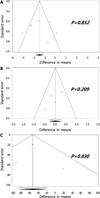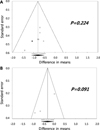Abstract
Purpose
This meta-analysis aimed to evaluate the effect of cassia cinnamon (Cinnamomum. cassia and C. aromaticum) on the glycemic response with a focus on the preparation of dehydrated powder and water extract.
Methods
We searched Pubmed, Cochrane, EMBASE, Science Direct, and the Korean Studies Information Service System (KISS) through May 2017. In the meta-analysis for the preparation of powder, eight trials reporting fasting blood glucose (FBG), four trials reporting HbA1c, and three trials reporting the postprandial glycemic response were included. For the water extract, six trials reporting FBG and four trials reporting HbA1c were eligible for this study. A random-effects model was used to calculate the pooled effect size.
Results
Cassia cinnamon powder intake significantly lowered FBG by −1.55 mmol/L (95% CI, −2.45, −0.64; p = 0.001) and the AUC of postprandial blood glucose level by −51.8 mmol/L·min (95% CI, −85.5, −18.1; p = 0.003). There was a significant difference in FBG between water extract of cinnamon and placebo of −0.76 mmol/L (95% CI, −1.09, −0.43; p = 0.000). However, blood HbA1c level was not significantly altered by any preparation of cinnamon. No statistical heterogeneity was observed for any analysis except in the case of FBG for cinnamon powder. Results of funnel plots and Egger's regression suggest a low likelihood of publication bias in all biomarkers (p > 0.05).
Conclusion
According to this meta-analysis, there was possible evidence to support a relationship between cassia cinnamon intake and fasting glucose in both preparation of powder and water extract. Furthermore, new evidence of the health benefits on postprandial glucose regulation of cinnamon powder was obtained.
Figures and Tables
 | Fig. 2Forest plot results of the effect of cassia cinnamon powder supplementation on (A) fasting blood glucose, (B) HbA1c, (C) AUC of postprandial blood glucose |
 | Fig. 3Forest plot results of the effect of cassia cinnamon water extract supplementation on (A) fasting blood glucose, (B) HbA1c |
 | Fig. 4Funnel plot showing the effect of cassia cinnamon powder supplementation on (A) fasting blood glucose, (B) HbA1c, (C) AUC of postprandial blood glucose |
References
1. Statistics Korea. Cause of death statistics 2015. Daejeon: Statistics Korea;2016.
2. Korean Diabetes Association. Treatment guideline for diabetes 2015. Seoul: Korean Diabetes Association;2015.
3. Ministry of Food and Drug Safety (KR). Standards and specifications of food (2017-57). Cheongju: Ministry of Food and Drug Safety;2017.
4. Ministry of Food and Drug Safety (KR). Herbal medicine standard for pharmaceutical medicine in Korea (2016-92). Cheongju: Ministry of Food and Drug Safety;2016.
5. Health Canada. Natural health products ingredients database [Internet]. Ottawa: Health Canada;2014. cited 2017 Aug 7. Available from: https://www.canada.ca/en.html.
6. Ministry of Food and Drug Safety (KR). Guidance for the evaluation on the functionality of health functional food. Cheongju: Ministry of Food and Drug Safety;2008.
7. U.S. Food and Drug Administration. Guidance for industry: evidence-based review system for the scientific evaluation of health claims [Internet]. Silver Spring (MD): U.S. Food and Drug Administration;2009. cited 2017 Aug 7. Available from: https://www.fda.gov/Food/GuidanceRegulation/GuidanceDocuments-RegulatoryInformation/LabelingNutrition/ucm073332.htm.
8. European Food Safety Authority. Scientific and technical guidance for the preparation and presentation of an application for authorisation of a health claim (revision 1) [Internet]. Parma: European Food Safety Authority;2011. cited 2017 Aug 7. Available from: http://www.efsa.europa.eu/en/efsajournal/pub/2170.htm.
9. Kwak JS, Kim JY, Paek JE, Lee YJ, Kim HR, Park DS, Kwon O. Garlic powder intake and cardiovascular risk factors: a meta-analysis of randomized controlled clinical trials. Nutr Res Pract. 2014; 8(6):644–654.

10. Kim JY, Kwon O. Garlic intake and cancer risk: an analysis using the Food and Drug Administration's evidence-based review system for the scientific evaluation of health claims. Am J Clin Nutr. 2009; 89(1):257–264.

11. Kwak JS, Park MY, Kwon O. The effect of walnut (Juglans regia L.) intake on improvement of blood lipid levels and vascular health: a meta-analysis. J Nutr Health. 2014; 47(4):236–246.
12. Kwak JS, Paek JE, Jeong S, Kim J, Kim JY, Kwon O. Systematic review of the effect of dried ginger powder on improvement of nausea and vomiting associated with early pregnancy or motion sickness. J Nutr Health. 2014; 47(1):45–50.

13. Jeong S, Kim JY, Paek JE, Kim J, Kwak JS, Kwon O. Systematic review of the effect of omega-3 fatty acids on improvement of blood flow while focused on evaluation of claims for health functional food. J Nutr Health. 2013; 46(3):226–238.

14. Kim JY, Jeong S, Paek JE, Kim J, Kwak JS, Lee YJ, Kang TS, Kwon O. Systematic review of the effect of coenzyme Q10 on antioxidant capacity while focused on evaluation of claims for health functional food. J Nutr Health. 2013; 46(3):218–225.

15. Higgin JP, Green S. Cochrane handbook for systematic reviews of interventions: version 5.1.0. London: The Cochrane Collaboration;2011.
16. DerSimonian R, Laird N. Meta-analysis in clinical trials revisited. Contemp Clin Trials. 2015; 45(Pt A):139–145.

17. Lau J, Ioannidis JP, Schmid CH. Quantitative synthesis in systematic reviews. Ann Intern Med. 1997; 127(9):820–826.

18. Higgins JP, Thompson SG, Deeks JJ, Altman DG. Measuring inconsistency in meta-analyses. BMJ. 2003; 327(7414):557–560.

19. Egger M, Smith GD, Phillips AN. Meta-analysis: principles and procedures. BMJ. 1997; 315(7121):1533–1537.

20. Akilen R, Tsiami A, Devendra D, Robinson N. Glycated haemoglobin and blood pressure-lowering effect of cinnamon in multiethnic type 2 diabetic patients in the UK: a randomized, placebocontrolled, double-blind clinical trial. Diabet Med. 2010; 27(10):1159–1167.

21. Khan A, Safdar M, Ali Khan MM, Khattak KN, Anderson RA. Cinnamon improves glucose and lipids of people with type 2 diabetes. Diabetes Care. 2003; 26(12):3215–3218.

22. Magistrelli A, Chezem JC. Effect of ground cinnamon on postprandial blood glucose concentration in normal-weight and obese adults. J Acad Nutr Diet. 2012; 112(11):1806–1809.

23. Solomon TP, Blannin AK. Effects of short-term cinnamon ingestion on in vivo glucose tolerance. Diabetes Obes Metab. 2007; 9(6):895–901.

24. Solomon TP, Blannin AK. Changes in glucose tolerance and insulin sensitivity following 2 weeks of daily cinnamon ingestion in healthy humans. Eur J Appl Physiol. 2009; 105(6):969–976.
25. Soni R, Bhatnagar V. Effect of cinnamon (Cinnamomum cassia) intervention on blood glucose of middle aged adult male with non insulin dependent diabetes mellitus (NIDDM). Stud Ethno Med. 2009; 3(2):141–144.

26. Suppapitiporn S, Kanpaksi N, Suppapitiporn S. The effect of cinnamon cassia powder in type 2 diabetes mellitus. J Med Assoc Thai. 2006; 89:Suppl 3. S200–S205.
27. Vanschoonbeek K, Thomassen BJ, Senden JM, Wodzig WK, van Loon LJ. Cinnamon supplementation does not improve glycemic control in postmenopausal type 2 diabetes patients. J Nutr. 2006; 136(4):977–980.

28. Wainstein J, Stern N, Heller S, Boaz M. Dietary cinnamon supplementation and changes in systolic blood pressure in subjects with type 2 diabetes. J Med Food. 2011; 14(12):1505–1510.

29. Anderson RA, Zhan Z, Luo R, Guo X, Guo Q, Zhou J, Kong J, Davis PA, Stoecker BJ. Cinnamon extract lowers glucose, insulin and cholesterol in people with elevated serum glucose. J Tradit Complement Med. 2016; 6(4):332–336.

30. Lu T, Sheng H, Wu J, Cheng Y, Zhu J, Chen Y. Cinnamon extract improves fasting blood glucose and glycosylated hemoglobin level in Chinese patients with type 2 diabetes. Nutr Res. 2012; 32(6):408–412.

31. Mang B, Wolters M, Schmitt B, Kelb K, Lichtinghagen R, Stichtenoth DO, Hahn A. Effects of a cinnamon extract on plasma glucose, HbA, and serum lipids in diabetes mellitus type 2. Eur J Clin Invest. 2006; 36(5):340–344.
32. Roussel AM, Hininger I, Benaraba R, Ziegenfuss TN, Anderson RA. Antioxidant effects of a cinnamon extract in people with impaired fasting glucose that are overweight or obese. J Am Coll Nutr. 2009; 28(1):16–21.

33. Ziegenfuss TN, Hofheins JE, Mendel RW, Landis J, Anderson RA. Effects of a water-soluble cinnamon extract on body composition and features of the metabolic syndrome in pre-diabetic men and women. J Int Soc Sports Nutr. 2006; 3(2):45–53.

34. Verspohl EJ, Bauer K, Neddermann E. Antidiabetic effect of Cinnamomum cassia and Cinnamomum zeylanicum in vivo and in vitro. Phytother Res. 2005; 19(3):203–206.
35. Kim SH, Choung SY. Antihyperglycemic and antihyperlipidemic action of Cinnamomi Cassiae (Cinnamon bark) extract in C57BL/Ks db/db mice. Arch Pharm Res. 2010; 33(2):325–333.

36. Anderson RA. Chromium and polyphenols from cinnamon improve insulin sensitivity. Proc Nutr Soc. 2008; 67(1):48–53.

37. Song MY. The effects of cinnamomum cassia blume, aconitum carmichaeli debx, and pueraria lobata benth on glucose and energy metabolism in C2C12 myotubes. J Korean Med Obes Res. 2015; 15(2):131–136.

38. Subash Babu P, Prabuseenivasan S, Ignacimuthu S. Cinnamaldehyde--a potential antidiabetic agent. Phytomedicine. 2007; 14(1):15–22.

39. Plaisier C, Cok A, Scott J, Opejin A, Bushhouse KT, Salie MJ, Louters LL. Effects of cinnamaldehyde on the glucose transport activity of GLUT1. Biochimie. 2011; 93(2):339–344.

40. Lee KS, Yang CB. Screening of oriental drugs for α-amylase inhibitor. Korean J Food Sci Technol. 1988; 20(5):644–649.
41. Kang BH, Racicot K, Pilkenton SJ, Apostolidis E. Evaluation of the in vitro anti-hyperglycemic effect of Cinnamomum cassia derived phenolic phytochemicals, via carbohydrate hydrolyzing enzyme inhibition. Plant Foods Hum Nutr. 2014; 69(2):155–160.

42. Allen RW, Schwartzman E, Baker WL, Coleman CI, Phung OJ. Cinnamon use in type 2 diabetes: an updated systematic review and meta-analysis. Ann Fam Med. 2013; 11(5):452–459.

43. Akilen R, Tsiami A, Devendra D, Robinson N. Cinnamon in glycaemic control: Systematic review and meta analysis. Clin Nutr. 2012; 31(5):609–615.

44. Davis PA, Yokoyama W. Cinnamon intake lowers fasting blood glucose: meta-analysis. J Med Food. 2011; 14(9):884–889.

45. Leach MJ, Kumar S. Cinnamon for diabetes mellitus. Cochrane Database Syst Rev. 2012; (9):CD007170.





 PDF
PDF ePub
ePub Citation
Citation Print
Print





 XML Download
XML Download